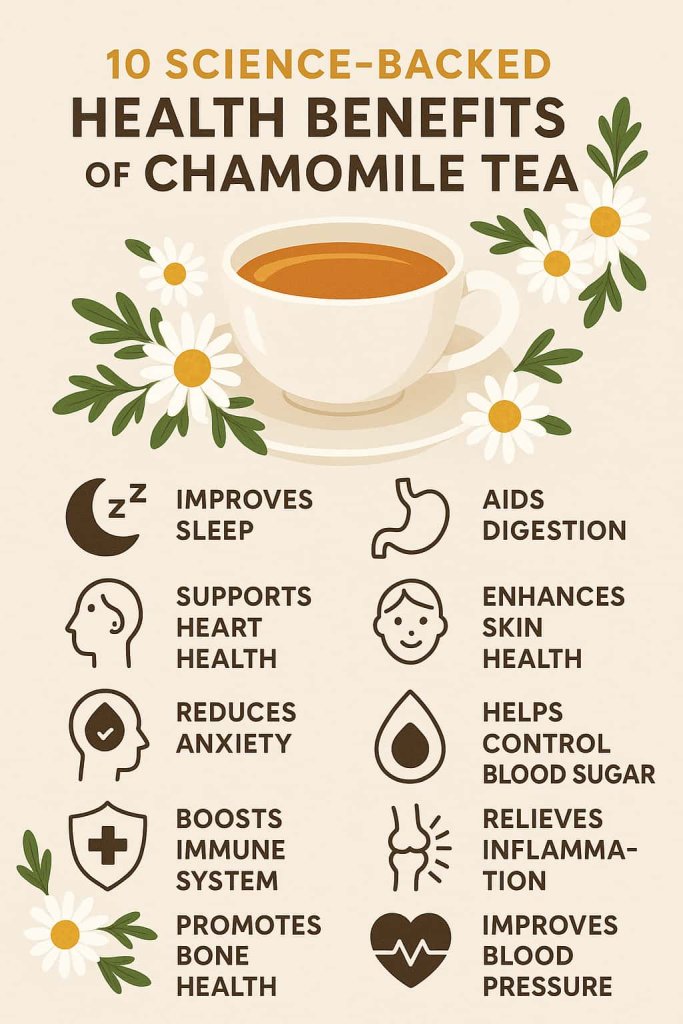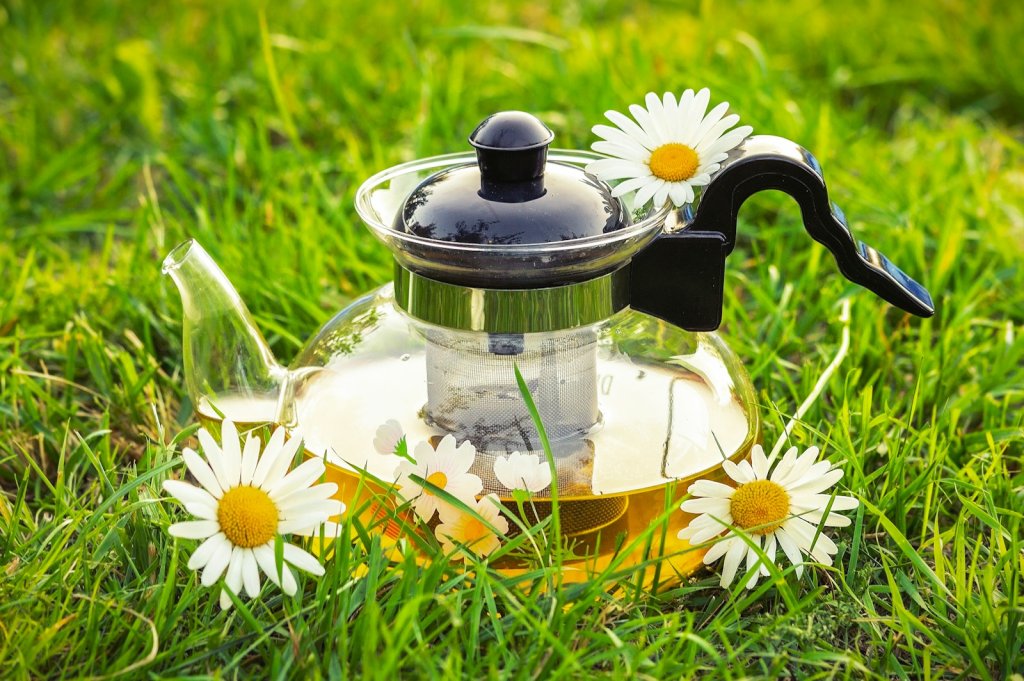Chamomile tea is one of the best natural remedies for relaxation, better sleep, and stress relief — all backed by modern scientific research.
Made from the dried flowers of the Matricaria chamomilla plant, this fragrant, golden-hued tea has been cherished for centuries in ancient Egypt, Greece, and Rome for its calming, healing, and anti-inflammatory properties.

Today, chamomile tea remains one of the most popular herbal drinks worldwide — not only because it’s caffeine-free and naturally soothing, but because studies show it offers a wide range of health benefits for your mind, body, and overall well-being.
Understanding the science behind chamomile tea helps you use it effectively — whether you’re drinking it for better sleep, digestive comfort, heart support, or stress relief. In this complete guide, you’ll discover:
- What chamomile tea is and why it’s so beneficial
- The 10 proven health benefits supported by research
- The best ways to brew and enjoy it naturally
- Safe daily intake, possible side effects, and expert FAQs
Trusted sources like Harvard Health, the National Institutes of Health (NIH), and Medical News Today confirm that chamomile contains powerful antioxidants such as apigenin and bisabolol that work together to calm your nervous system, ease inflammation, and support long-term wellness.
So, if you’ve ever wondered why chamomile tea is so good for you, this guide breaks down everything you need — backed by real science and practical wellness tips.
What Is Chamomile Tea?
Chamomile tea is a caffeine-free herbal infusion made from the dried flowers of the chamomile plant, prized for its natural calming effects and pleasant floral taste.
There are two main varieties used for tea:
- German chamomile (Matricaria chamomilla) – the most common type found in teas worldwide; it has a mild, sweet, apple-like flavor.
- Roman chamomile (Chamaemelum nobile) – slightly more aromatic and often used in essential oils and herbal extracts.
Originating in ancient Egypt and Europe, chamomile has been used for over 2,000 years as a natural remedy for anxiety, inflammation, and insomnia. Today, it remains one of the most widely consumed herbal teas across the globe.
Chamomile’s power lies in its bioactive compounds, including:
- Apigenin – a flavonoid that binds to brain receptors to promote calm and sleep (PubMed)
- Luteolin – a strong antioxidant that helps protect cells from oxidative stress (Healthline)
- Bisabolol – an anti-inflammatory essential oil known for its skin-soothing effects (Medical News Today)
Chamomile tea is naturally free of caffeine, low in calories, and rich in plant antioxidants, making it a gentle, all-day beverage for both relaxation and health support.
Why Chamomile Tea Matters for Your Health

Understanding why chamomile tea is good for your body helps you make the most of its therapeutic potential. This simple herbal drink supports multiple systems at once — from your nervous system to your gut, skin, and heart.
Here’s why it deserves a place in your daily wellness routine:
- Calms the nervous system — The compound apigenin interacts with GABA receptors in your brain to reduce anxiety and tension, promoting deep relaxation (Harvard Health).
- Reduces inflammation — Chamomile’s antioxidants help fight chronic inflammation linked to heart disease, arthritis, and metabolic syndrome.
- Improves digestion — It relaxes intestinal muscles, reduces bloating, and soothes mild gastrointestinal irritation (WebMD).
- Supports heart and immune health — Flavonoids in chamomile can help balance cholesterol, improve circulation, and strengthen immune defenses.
- Enhances sleep and emotional balance — Drinking it before bedtime naturally encourages better sleep quality without caffeine or synthetic sleep aids.
In short, chamomile tea is a multi-benefit herbal tonic that promotes calm, balance, and overall well-being — backed by both traditional wisdom and modern science.
Nutritional Profile of Chamomile Tea
While chamomile tea is not a major source of macronutrients, it’s rich in bioactive plant compounds that have powerful effects on your body.
These naturally occurring phytochemicals contribute to its calming, antioxidant, and anti-inflammatory properties.
| Nutrient / Compound | Amount (per cup) | Primary Role in the Body |
|---|---|---|
| Apigenin | Trace (varies by brand) | Anti-anxiety and sleep-promoting flavonoid; binds to GABA receptors (PubMed) |
| Luteolin | Trace | Potent antioxidant that protects cells from oxidative stress (MDPI) |
| Bisabolol | Trace (essential oil) | Anti-inflammatory and skin-soothing compound (Medical News Today) |
| Potassium | ~5–10 mg | Supports heart rhythm and nerve function (USDA FoodData Central) |
| Calcium | ~2–4 mg | Aids bone, muscle, and nerve health |
| Polyphenols | Variable | Overall antioxidant protection and anti-aging benefits |
Did you know? A single cup of chamomile tea can deliver up to 1,000 micrograms of apigenin, depending on the steeping time and flower quality — the main reason it has a calming effect (ScienceDirect).
These compounds work synergistically to:
- Reduce stress and anxiety
- Support digestive and immune health
- Neutralize free radicals
- Enhance skin and cardiovascular protection
That’s why nutritionists often recommend chamomile tea as part of a holistic wellness routine — a natural, gentle way to nurture both body and mind.
10 Science-Backed Health Benefits of Chamomile Tea
Chamomile tea is more than a soothing bedtime drink — it’s a herbal powerhouse backed by science.
Below are ten proven benefits that make it one of the healthiest caffeine-free teas you can enjoy daily.
1. Promotes Better Sleep and Relaxation 😴

Chamomile’s most famous benefit is its natural sleep-inducing power.
Its key antioxidant, apigenin, binds to certain receptors in your brain that promote calm and relaxation — similar to how mild anti-anxiety medications work, but without the side effects.
A 2024 meta-analysis published on PubMed confirmed that chamomile improves overall sleep quality and helps reduce insomnia severity in adults.
Another clinical trial in BMC Complementary Medicine and Therapies found significant improvements in participants’ Pittsburgh Sleep Quality Index (PSQI) scores after eight weeks of use.
Tip: Drink one cup about 30 minutes before bed. Steep 5–10 minutes to preserve the essential oils and cover the cup to trap steam.
References:
Sleep Foundation – Does Chamomile Tea Help You Sleep?
2. Reduces Anxiety and Stress Naturally 🌿

Chamomile acts as a gentle natural anxiolytic, helping to calm the nervous system and reduce feelings of tension.
A 2024 review in Clinical Nutrition Research found that 9 out of 10 human trials reported significant anxiety relief with chamomile supplementation.
Earlier work in Phytotherapy Research also found measurable reductions in Generalized Anxiety Disorder (GAD) scores after regular use.
Chamomile’s flavonoids and terpenoids appear to reduce cortisol levels and modulate GABA and serotonin activity — neurotransmitters responsible for mood and relaxation.
Tip: Sip 1–2 cups daily or use during stressful moments. Combine with mindfulness or deep breathing for best results.
References:
NIH PMC – Chamomile for Anxiety Review 2024 | Harvard Health – Herbal Teas and Stress Relief
3. Supports Digestive Health and Comfort 🍵

Chamomile has been used for centuries to soothe the stomach and ease digestive discomfort.
Modern research confirms its antispasmodic and anti-inflammatory actions in the gut, helping relieve gas, bloating, cramps, and mild acid reflux.
According to WebMD’s Chamomile Supplement Guide, chamomile tea can calm intestinal muscles and promote smoother digestion.
It may also help reduce symptoms of Irritable Bowel Syndrome (IBS) by relaxing smooth muscle tissue and reducing intestinal inflammation.
Try this: Drink a warm cup after heavy meals, or combine chamomile with peppermint or ginger for extra digestive support.
References:
Medical News Today – Chamomile Tea Benefits
4. Fights Inflammation and Oxidative Stress

Chamomile is packed with powerful antioxidants like luteolin, apigenin, and quercetin, which protect your cells from oxidative damage.
According to Harvard Health, chamomile tea is one of the top herbal drinks for fighting chronic inflammation and promoting cellular repair.
A 2023 study highlighted in Medical News Today explained that chamomile’s polyphenols help inhibit pro-inflammatory cytokines — substances linked to aging and disease.
Tip: Pair chamomile with a diet rich in antioxidant foods (berries, olive oil, leafy greens) to maximize protection.
5. Supports Heart Health and Cholesterol ❤️

Chamomile’s flavonoids may help lower LDL (“bad”) cholesterol and improve overall cardiovascular health.
A clinical trial published in Nutrition Journal (as cited by Healthline) found that adults who drank chamomile tea after meals for eight weeks experienced better cholesterol and triglyceride profiles than control subjects.
Chamomile’s antioxidants also help protect blood vessels from oxidative stress and may aid in reducing blood pressure over time.
Tip: Enjoy chamomile tea after meals instead of sugary drinks — it supports both your digestion and your heart.
6. Helps Regulate Blood Sugar Levels 🩸

Emerging research suggests chamomile can help regulate blood sugar.
A 2023 review highlighted by SciTechDaily found that chamomile’s antioxidants protect pancreatic cells, improving insulin sensitivity and glucose metabolism.
These findings suggest chamomile tea may be a gentle complement to lifestyle changes for people managing type 2 diabetes — though it shouldn’t replace medication.
Tip: Drink 1 cup after meals to help maintain steady blood sugar. Pair with a balanced, low-sugar diet.
7. Relieves Menstrual Pain and PMS Symptoms 💫

Chamomile’s antispasmodic and anti-inflammatory properties make it a natural choice for menstrual cramps and PMS relief.
A small 2023 trial summarized by EatingWell reported that women who drank chamomile tea daily experienced less pain and irritability during menstruation compared to a control group.
Chamomile works by relaxing uterine muscles and reducing the prostaglandins responsible for cramping.
Tip: Start sipping chamomile a few days before your period and continue through the first 2–3 days.
8. Supports Skin Health and Healing 🌸

Chamomile tea’s natural anti-inflammatory and antimicrobial compounds support healthy skin inside and out.
Studies on PubMed Central (PMC) show that chamomile extracts can help wounds heal faster and reduce symptoms of eczema and dermatitis when applied topically or consumed regularly.
According to WebMD, chamomile has been used safely to calm oral mucositis in cancer care and improve minor skin irritations.
Tip: Use cooled chamomile tea as a gentle skin rinse or compress to reduce inflammation and redness.
9. Strengthens Immunity and Soothes Cold Symptoms 🤧

Sipping warm chamomile tea can help relieve sore throat, cough, and nasal congestion.
It’s naturally antibacterial and soothing, making it one of the best herbal remedies for seasonal colds.
Medical News Today notes that chamomile contains phenolic compounds that boost immune activity and protect mucous membranes.
Its warm steam can also ease breathing and moisturize irritated airways.
Tip: Add honey and lemon to your chamomile tea for extra antimicrobial and vitamin C benefits.
10. May Support Cancer Prevention and Recovery 🧬

While not a cure, early studies show that chamomile’s apigenin and quercetin may help inhibit tumor growth and reduce oxidative stress associated with cancer development.
Laboratory findings published on PubMed Central (PMC) found that chamomile extracts triggered apoptosis (cell death) in certain cancer cell lines.
Chamomile is also used as a complementary therapy to ease side effects of chemotherapy — such as oral mucositis and skin irritation — due to its anti-inflammatory nature.
Tip: Always discuss herbal tea use with your doctor if you’re undergoing cancer treatment. Chamomile should complement, not replace, medical care.
Best Natural Ways to Enjoy Chamomile Tea

Chamomile tea is more than a soothing bedtime beverage — it’s a ritual of calm, comfort, and wellness. The way you prepare and drink it can greatly influence its aroma, potency, and relaxation benefits. Here are the best natural ways to enjoy chamomile tea every day.
1. Perfect Brewing Method
To get the most out of chamomile’s antioxidants and essential oils, brewing it properly is key.
Follow these simple steps:
- Boil fresh water and let it cool slightly (ideal temperature around 95°C / 203°F).
- Add 1–2 teaspoons of dried chamomile flowers or one tea bag to your cup or teapot.
- Cover and steep for 5–10 minutes — covering helps preserve volatile oils like bisabolol and chamazulene, which are responsible for its healing and anti-inflammatory effects.
- Strain, sip, and enjoy slowly.
If you want a milder tea, steep for 5 minutes; for a stronger, more therapeutic cup, let it steep up to 10 minutes.
👉 According to Harvard Health, covering your tea during steeping helps retain beneficial antioxidants and essential oils that would otherwise evaporate with steam.
2. Natural Add-Ins and Pairings
Chamomile tea pairs beautifully with other natural ingredients that enhance its flavor and therapeutic benefits. Try these delicious and health-friendly combinations:
| Add-In | Benefits |
|---|---|
| Honey | Adds natural sweetness, soothes sore throat, and boosts antimicrobial effects (Mayo Clinic) |
| Lemon | Adds vitamin C, supports immunity, and enhances flavor |
| Lavender | Deepens relaxation and helps improve sleep quality |
| Mint or Ginger | Aids digestion and refreshes breath |
| Cinnamon or Turmeric | Adds antioxidants and helps reduce inflammation |
For a bedtime blend, combine chamomile with lavender and a touch of honey.
For digestion, mix chamomile with ginger or peppermint after meals.
3. Best Times to Drink Chamomile Tea
When you drink chamomile tea can make all the difference in how it benefits your body:
- 🌙 Before Bed:
Drink a warm cup 30–60 minutes before bedtime to calm the mind, relax muscles, and promote deep sleep. Studies show chamomile may improve sleep quality by reducing anxiety and promoting GABA activity in the brain (PubMed). - 🍽️ After Meals:
Enjoy it after lunch or dinner to relieve bloating, aid digestion, and ease gas discomfort (WebMD). - ☀️ During the Day:
A mild, cooled version can be sipped mid-afternoon to ease stress and help you stay calm and focused without caffeine.
Most people benefit from 1–3 cups per day depending on their needs — one after meals and one before bed are ideal for balanced wellness.
4. Storage and Freshness Tips
Chamomile flowers are naturally delicate and can easily lose their aroma, flavor, and beneficial plant compounds if not stored properly. Proper storage helps preserve their antioxidant strength and therapeutic potency, ensuring every cup of tea remains as effective as the day it was packaged.
To keep your chamomile tea fresh and potent:
- Store dried chamomile in an airtight glass jar or tin container to protect it from air, moisture, and light exposure.
- Keep the container in a cool, dry, and dark place — away from direct sunlight, ovens, or humid environments like the kitchen sink area.
- Avoid placing it near strong-smelling items such as coffee, spices, or garlic, as chamomile can absorb surrounding odors.
- Use within 6–8 months of opening for the best aroma, color, and antioxidant activity.
- For tea bags, transfer them to a sealed zipper pouch or vacuum jar after opening to prevent moisture and contamination.
According to the University of Florida Institute of Food and Agricultural Sciences (UF/IFAS) Extension, dried herbs should always be stored in tightly sealed containers kept in cool, dry, and dark conditions to maintain quality, flavor, and safety over time.
👉 University of Florida IFAS Extension – Preserving Herbs and Spices
Following these evidence-based storage guidelines ensures that your chamomile tea retains its aromatic oils, antioxidants, and wellness benefits — from relaxation and digestive support to overall immune health.
Quick Tip:
For a deeply relaxing nighttime ritual, combine one cup of warm chamomile tea with a few minutes of slow breathing or meditation. This helps your nervous system fully absorb the calming effects — a natural, science-backed way to prepare for restful sleep.
Recommended Daily Intake, Safety & Side Effects
Chamomile tea is considered safe for most people and can be enjoyed daily. However, understanding the right dosage and potential side effects ensures you benefit from its calming effects without risk.
| Group | Recommended Intake | Guidelines & Precautions |
|---|---|---|
| Healthy Adults | 1–3 cups per day | Supports sleep, mood, and digestion. |
| Pregnant or Nursing Women | Consult your healthcare provider | Limited safety data; may mildly stimulate the uterus. |
| Children (6–12 years) | ½–1 cup daily | Use a weaker brew; avoid if allergic to daisies or ragweed. |
| Medication Users | Doctor consultation required | Chamomile may interact with anticoagulants (e.g., warfarin), sedatives, or immunosuppressants (NIH Office of Dietary Supplements). |
| Allergy-Prone Individuals | Avoid if allergic to ragweed, daisies, or chrysanthemums | Cross-reactivity is possible. |
Safety Tips
- Avoid very hot tea (>65 °C) — as noted by the World Health Organization, extremely hot drinks can irritate the throat.
- Choose pure, caffeine-free chamomile without artificial flavors or additives.
- Stop drinking immediately if you notice rash, dizziness, or difficulty breathing — signs of possible allergy.
- Don’t mix chamomile supplements with prescription sleep or anxiety medications unless directed by a physician (Mayo Clinic).
When consumed responsibly, chamomile tea is one of the safest herbal remedies for relaxation and overall wellness.
Frequently Asked Questions (FAQ)
1. Can I drink chamomile tea every day?
Yes. Drinking 1–3 cups daily is safe for most adults and offers ongoing benefits for sleep, digestion, and relaxation.
2. Does chamomile tea actually help you sleep?
Yes — research confirms chamomile’s compound apigenin promotes better sleep quality and relaxation by binding to calming brain receptors (PubMed).
3. Is chamomile tea caffeine-free?
Absolutely. Chamomile is naturally caffeine-free, making it ideal for evenings or anyone sensitive to caffeine.
4. Can pregnant women drink chamomile tea?
Only with medical supervision. While mild use is common, some evidence suggests chamomile may slightly stimulate uterine muscles (Healthline).
5. Does chamomile help reduce anxiety?
Yes. Multiple clinical trials show chamomile can reduce mild to moderate anxiety symptoms through its calming and anti-inflammatory effects.
6. How long should I steep chamomile tea?
Steep for 5–10 minutes in covered hot water to release full flavor and active compounds.
7. Can chamomile tea interact with medications?
Yes. It may interact with blood thinners, sedatives, and immune-modulating drugs. Always consult your healthcare provider before daily use.
Conclusion
Chamomile tea isn’t just a comforting drink — it’s a scientifically supported herbal ally for better sleep, calmer moods, improved digestion, and reduced inflammation.
Regularly enjoying this floral tea can help you:
- Sleep more deeply and wake up refreshed
- Manage stress and anxiety naturally
- Support your heart, digestion, and skin health
- Boost relaxation and overall well-being
With its delicate aroma and centuries of proven benefits, chamomile remains one of the most powerful herbs for holistic health.
Start or end your day with a warm cup of chamomile tea and experience the soothing, science-backed calm your body and mind deserve.
References
- National Center for Complementary and Integrative Health (NCCIH).
“Chamomile: Usefulness and Safety.”
Comprehensive overview of chamomile types, benefits, and safety considerations.
👉 https://www.nccih.nih.gov/health/chamomile
- Kazemi, A. et al. (2024).
“Effects of Chamomile (Matricaria chamomilla L.) on Sleep Quality: A Meta-Analysis of Clinical Trials.”
Found significant improvement in sleep quality and relaxation in adults.
👉 https://pubmed.ncbi.nlm.nih.gov/39106912/
- Saadatmand, S. et al. (2024).
“The Effect of Oral Chamomile on Anxiety: A Systematic Review of Clinical Trials.”
Reported reduced anxiety levels in 9 of 10 human studies.
👉 https://e-cnr.org/DOIx.php?id=10.7762/cnr.2024.13.2.139
- Srivastava, J. K., Shankar, E., & Gupta, S. (2010).
“Chamomile: A Herbal Medicine of the Past with a Bright Future.” Molecular Medicine Reports.
Comprehensive review covering chamomile’s anti-inflammatory, antioxidant, and antimicrobial mechanisms.
👉 https://www.ncbi.nlm.nih.gov/pmc/articles/PMC2995283/
